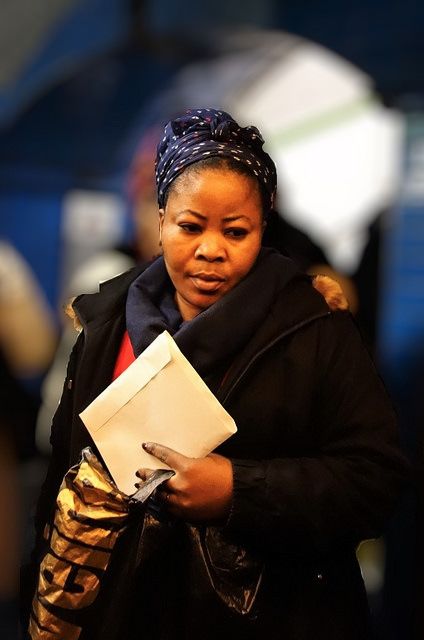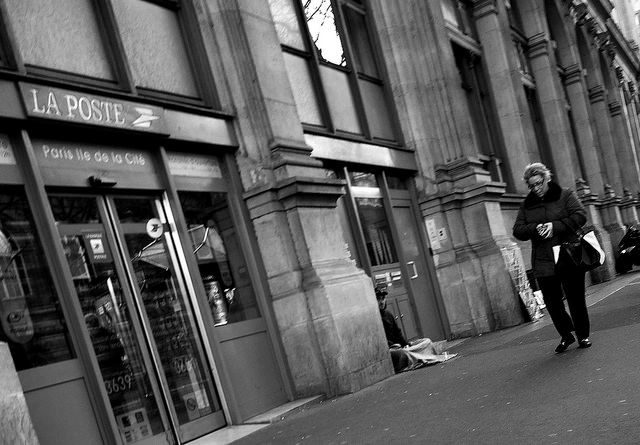She Thought I Knew What I Was Doing
PARIS–Mailing a package here used to rattle me. After two years in Paris, I have finally figured out how things generally work at La Poste, but I still have to concentrate; sometimes the clerk will say something I don’t catch. When I try to guess what to answer, my French comes out flustered and awkward.
Let’s just say, somehow I manage to get by.
So it was the blind leading the blind last week; I had popped into a neighborhood branch and was busy filling out a mailing label (to any outsider, it must have looked like I knew what I was doing) when a woman in an African headscarf and matching floral robe shuffled up to me. In Paris, strangers usually don’t talk to you unless they are adamantly telling you to get out of their way. This lady had some registered mail forms in her hands, so I figured she wanted me to move over and give her half of the small work space in the post office.
Often in these situations, I don’t utter a word but simply nod and do whatever seems polite. Yet after I had scooted over, the African woman stood looking at me, waving her forms under my nose. I realized she must want me to answer a question.
This poor woman doesn’t know I am a foreigner like herself, I thought. I told her in my heavily-Anglicized French to get one of the postal employees to advise her. Several of them were standing nearby, chit chatting with one another. For once, there was no line.
I AM NOT QUALIFIED TO HELP
I returned my focus to my own paperwork but the African lady was not satisfied. Thrusting her forms toward me again, she told me in French that she had asked the employees and they had refused to help her. How bizarre, I thought. But there is no use arguing with a French fonctionnaire; they are as inflexible as miniature Napoleons.
Apparently this woman is stuck with me. What if I can’t figure out whatever she is trying to do?
Despite my self doubts, I accepted her forms and began methodically to read them. One thing I have learned from living abroad is to be patient in trying to solve things. I cannot skim a document in French and understand what is required. I must read it, digest it, and then proceed. I am confident that, if I tackle a problem in a sure and steady pace, I will prevail.
The African lady stood by, waiting expectantly. After several moments, I looked up and began to explain what she needed to do: write the delivery address in this box, and write her own name and address in that box. Yet the mahogany-skinned lady pushed the forms back at me and pointed at my pen.

Oh! She wanted me to fill out the forms for her. She had the delivery addresses already printed on two medium-sized envelopes, but the triplicate registered mail forms were blank. It took a few seconds before it dawned on me: the woman did not know how to write. She must have gotten someone else to address the envelopes before arriving at La Poste. She was probably surprised when the postal employees had given her the required paperwork to fill out.
Of course I agreed to help, yet I felt inept as I began to copy the addresses onto the old-fashioned forms. The French write very neatly, and these index-cardesque forms did not have lines for writing; they had rows of tiny cubes which allowed only limited space per letter. Neat Japanese characters would fit nicely but the petit cubes were challenging for my undisciplined, Anglo scrawl. I did my best to write clearly and to imitate the pretty pattern of French script.
WHAT HAD SHE EXPERIENCED?
As I was working, I wondered about this woman’s childhood and education. Recently I had read a shocking autobiography called Infidel: My Life by Ayaan Hirsi Ali, the story of a Somalian girl who grew up poor and Muslim and eventually became Westernized and an atheist after moving to Holland. The book had allowed me to walk in the footsteps of someone raised among violent, clannish people who did not value educating women and who treated girl children like slaves.
Perhaps this woman’s life had been similar. That would explain why she could speak French but she could not read or write. I asked her: “Est-ce que vous etes d’Afrique?”
“Oui,” she said.
“Est-ce que vous etes musulman (Muslim)?”
She nodded. I looked at her floor-length robe, her batik-style scarf which covered every bit of her hair. It was similar to the way Ayaan and her tribal people had dressed before she ran away to Holland.
“Est-ce que vous etes du Somalia?” I ventured.
“Oui,” the woman replied, her eyes widening a bit that I had discerned her homeland.
I nodded kindly to her yet said nothing more; what was there to say?
Through reading Ayaan’s story, I knew that many of the Somalian women had undergone a horrific and dangerous female “circumcision”; many had been denied access to a full education, perhaps never taught to read and only allowed to memorize parts of the Koran; many had been married off as young adolescents against their wishes, often to men who were far older. The Somalian people practice a variant of Islam that overlaps with tribal superstitions.
Who knew what this woman had been through and what act of Providence had carried her to Paris?
ALMOST FINISHED!
Finally, I had successfully copied the delivery addresses into the rows of cubes. I had hoped the Somalian woman could print her own name and return address, but she shook her head and refused to take back the paperwork. She nodded, indicating that I must do this as well.
A moment of panic seized me. She was sure to have an exotic name that was foreign to my ears, and she was going to try to spell it aloud in French. When I hear the letter “e”, I still think it is an “e”, but in French, it is really an “i” that sounds like an “e”. Sometimes the “g” sounds like a “g” but sometimes it sounds like a “j”. And the “a” has a harsh sound as if someone is giving you a strep test with a stick down the back of your throat. Sometimes the “a” is coupled with another vowel and the union of the two is enough to leave my head spinning.
The simple act of writing out the woman’s name might take all afternoon.
“Peut-etre vous avez votre nom……” I indicated toward her bag.
She nodded and dug out a piece of paper that showed her name and address. Thank heavens! I was able to copy it down.
When I handed over the completed papers and smiled at the woman, I was surprised to feel tears threatening to spill down my cheeks. In France, there have been so many times when I have felt idiotic and somewhat illiterate, but here I had encountered someone who truly was trapped by illiteracy, and it had been a humbling experience to glimpse into her world and to offer her my assistance. I could empathize, rather than sympathize, with her plight.
A NAGGING QUESTION
After I returning to our flat, I shared my story with Sam and posed the question that was still nagging at me: why wouldn’t the postal employees fill out the forms for this Somalian lady? One of the clerks had actually thanked me afterwards for helping her out. If they weren’t being snobs, then what had been going on? “They probably aren’t allowed to fill out forms for people because of their union contracts,” Sam said. “It’s not in their job description.”
Ridiculous rules! France is full of inane bureaucratic rules that ignore the spiritual laws which govern the universe. Since our move abroad, God has expanded my mind and my worldview. One day while I was in prayer, the Holy Spirit suggested this idea: “Every life is sacred.” Of course I had heard this kind of thing before but I had not been forced to swim in it.
In France, we are not people of privilege. We ride the city bus; we stand in packed Metro cars; we walk all over the city, stepping around filth and sharing sidewalk space and park benches with every kind of ethnic group. I’ve learned to live among people of various colors, tribes, faiths, and languages; people who are extremely rich and extremely poor; people who are fleeing warfare and seeking refuge and people who are posing as chic, slick Parisians.
 I’ve been forced to confront a prejudice that I had not realized I was harboring: the idea that people from civilized countries such as the U.S.A., England, or France bring more value to the world than those from the undeveloped world, especially the destitute, uneducated, or tribal people. Somehow this Colonial notion had been passed down to me through the Anglo-Saxon generations, and I had absorbed it without even realizing it, until I found myself mixed in as part of a smelly stew pot of the global public.
I’ve been forced to confront a prejudice that I had not realized I was harboring: the idea that people from civilized countries such as the U.S.A., England, or France bring more value to the world than those from the undeveloped world, especially the destitute, uneducated, or tribal people. Somehow this Colonial notion had been passed down to me through the Anglo-Saxon generations, and I had absorbed it without even realizing it, until I found myself mixed in as part of a smelly stew pot of the global public.MONEY TALKS
Sure, you can make the case that someone running an international business creates more economic value than a refugee living on welfare. But in God’s eyes, each soul is equally beloved. Each soul should be treated with equal reverence.
Soon after being given the chance to rethink this idea, I was riding a tram in Holland. Most of the seats were taken, and I ended up squeezing in next to a young guy of African descent with Rosta braids. He was the kind of man who looked potentially threatening until he smiled; then I could see that he had kind eyes and was friendly. I had only been chatting with this guy for a few minutes, in a mixture of French and English, when he suddenly said: “Every life is sacred.”
I don’t know what led him to say this, but my jaw went slack. It felt as if God were highlighting his words with a red marker. I am telling you again, every life is sacred, because you are still hesitant.
By God’s grace, I am being given opportunities to practice living out this law, such as with the Somalian woman. It’s still an internal battle against long-held assumptions; sometimes it would be easier to fall back into my comfortable and self-serving pecking order. But I have turned a corner, and there is no going back.

photos courtesy of Vtek111
Pringle Franklin
Pringle Franklin is the author of Bazriel and the Frozen Bells of Noel, a fine art Christmas book about angels set in 1890s France. Her other titles include Hope & Healing in Marriage, True Stories of Renewed Love as well as Your Forever Friend. She is the founder of Jesus Street Press and the Dove Fund in Charleston, S.C.





9 Comments
Pringle, love being drawn into your adventure.
Your willingness to help the Somalian woman – and “the least of these, my brothers and sisters,” is heartening. Lots of love and peace, Pringle.
Thank you Pringle! “Every life is sacred”! I will carry that thought today and in the days ahead!
Blessings! Wendy
Beautiful. God clearly spoke to me in St Philip’s 3 1/2 years ago….He said, If you can’t stand up for my people, then you can’t stand up for me. It changed my life.
“But in God’s eyes, each soul is equally beloved. Each soul should be treated with equal reverence.”
Amen.
Love, love, love your wonderful, special, sacred story.
That’s a nice story. I had a similar experience when I worked in WV. It took me a while to figure out what was going on. In fact I had to ask my coworker and he told me the reason. I couldn’t believe there were illiterate in this day and age. Life teaches us many lessons, and sometimes brings us down a notch.
Wow, Pringle. That gave me chills when the man on the Metro said “Every Life is Sacred.” I love your heart and how your writing takes me into the event as if I am living it by your side. Blessings my friend.
Thank you Pringle, that is an encouraging story!
Pringle, you have a way of drawing us into your world. Thank you!